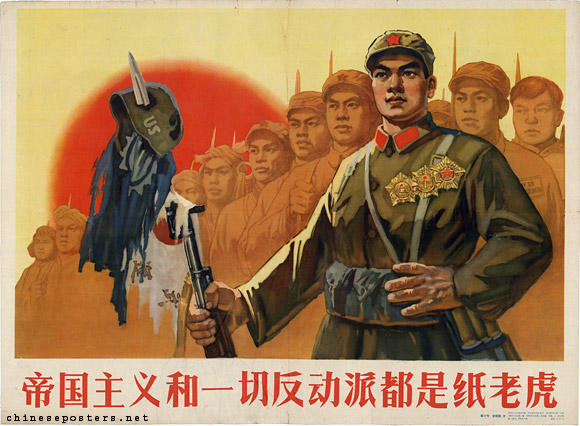More languages
More actions
(Image) Tag: Visual edit |
(Mao quote) Tag: Visual edit |
||
| Line 3: | Line 3: | ||
Certain reactionaries appose anything that can be considered modern, but where they drawn the line is often wherever is most politically convenient. In regards to reactionaries, their stance against [[socialism]] and [[communism]] is of the highest concern, but reactionaries also aim their hostilities toward any other movements or beliefs that threaten the status quo’s cultural and economic hegemony. This means an opposition to racial and [[national liberation]] movements, [[Feminism|women’s liberation]], [[LGBT+|queer]] rights movements, [[Trade union|labor unions]], modern art/music, and cultural movements, among others. | Certain reactionaries appose anything that can be considered modern, but where they drawn the line is often wherever is most politically convenient. In regards to reactionaries, their stance against [[socialism]] and [[communism]] is of the highest concern, but reactionaries also aim their hostilities toward any other movements or beliefs that threaten the status quo’s cultural and economic hegemony. This means an opposition to racial and [[national liberation]] movements, [[Feminism|women’s liberation]], [[LGBT+|queer]] rights movements, [[Trade union|labor unions]], modern art/music, and cultural movements, among others. | ||
[[Mao Zedong|Mao]] described reactionaries as "paper tigers," meaning they are terrifying but not as powerful as they seem.<ref>{{Citation|author=[[Mao Zedong]]|year=1946|title=Talk with the American Correspondent Anna Louise Strong|quote=All reactionaries are paper tigers. In appearance, the reactionaries are terrifying, but in reality they are not so powerful. From a long-term point of view, it is not the reactionaries but the people who are really powerful.|mia=https://www.marxists.org/reference/archive/mao/selected-works/volume-4/mswv4_13.htm}}</ref> | |||
== References == | |||
Revision as of 17:37, 17 February 2023

Reactionary is an umbrella term for those whose political ideologies seek to conserve the current structures of power. In a Marxist context this means the total opposition to any revolutionary movements and upholding capitalism, liberalism, imperialism, fascism, monarchism and/or feudalism. As such, reactionaries are usually conservative and hold a certain bygone era in high regard. This includes the veneration of classical art, traditional culture and appeals to religious thought.
Certain reactionaries appose anything that can be considered modern, but where they drawn the line is often wherever is most politically convenient. In regards to reactionaries, their stance against socialism and communism is of the highest concern, but reactionaries also aim their hostilities toward any other movements or beliefs that threaten the status quo’s cultural and economic hegemony. This means an opposition to racial and national liberation movements, women’s liberation, queer rights movements, labor unions, modern art/music, and cultural movements, among others.
Mao described reactionaries as "paper tigers," meaning they are terrifying but not as powerful as they seem.[1]
References
- ↑ “All reactionaries are paper tigers. In appearance, the reactionaries are terrifying, but in reality they are not so powerful. From a long-term point of view, it is not the reactionaries but the people who are really powerful.”
Mao Zedong (1946). Talk with the American Correspondent Anna Louise Strong. [MIA]
